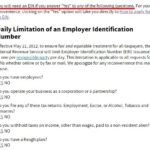Tax is one of the most commonly encountered things in our lifetime. We can’t deal with tax without a tax identification number (TIN). We get one of these to precede our tax dealings.
As there are various types of taxpayers, the IRS has designated different names for different kinds of taxes. Therefore, people often get confused about different types of taxes.
So you may ask, what is the difference between a tax identification number and an Employer Identification Number (or EIN)? Let’s understand what are they first:
What is Tax Identification Number (TIN)?
Contents
The tax identification number is a generic term issued by the IRS for tax identification. It is a 9 digit number unique to each individual, business, or other entity to track tax obligations and payments made to the IRS.
Every business/company that works in the United States must have a Tax ID. It is used by the Federal government, state and local government, banks, vendors, and creditors to identify your business.
Tax ID is often required for various matters such as hiring employees, opening a business bank account, getting business licenses, filing payroll taxes, etc.
The benefit of Tax ID is that it differentiates all the businesses with the same name. Companies with the same names will have unique tax IDs that will make the tax tracking and payment process easy.
When to Apply For TIN
Sole proprietorships and general partnerships are allowed to apply anytime for TIN. However, the same is not valid for corporations and LLCs.
Corporations and LLCs can apply for tax ID when the respective state agency approves their formation document.
Who Can Get a TIN?
You will need TIN if you fall under the following cases:
- You withhold tax while making payments
- You have business as a corporation, LLC, limited partnership
- You do business with estates, nonprofit organizations, trusts, or farmers’ cooperatives
- You do not use social security numbers for your business
- You have employees
- You file an employment-related tax return
- You want the calendar year and financial business year to be the same
Types of Tax Identification Numbers
The generic tax identification number is further divided into five types:
- EIN or Employer Identification Number
- ITIN or Individual Taxpayer Identification Number
- SSN or Social Security Number
- PTIN or Preparer Taxpayer Identification Number
- ATIN or Adoption Taxpayer Identification Number
What Is an Employer Identification Number (EIN)?
An Employer Identification Number (EIN) is a 9 digit number issued by IRS to identify the business entity/company. Although the name shows that it is related to employees, you don’t need employees to get EIN.
With EIN, IRS identifies all the taxpayers who are liable to file their business tax returns.
You can get EIN if you fulfill any of the given requirements:
- You have employees.
- You run as a corporation or a partnership firm.
- You withhold taxes.
- You do business with a trust, estate, nonprofit organization, or farmers’ cooperative,
Is There Any Difference Between Tax ID and EIN?
TIN identifies individuals and businesses to ensure tax compliance. Everyone should mention his TIN in tax returns and all other documents while filing with the IRS.
EIN is a type of TIN that is used to identify only businesses and not individuals. It is similar to a social security number that recognizes only businesses.
TIN is required for federal income tax and several other tax purposes. EIN is a must for the business owner for purposes such as opening a business bank account, filing your tax returns, and applying for business licenses.





